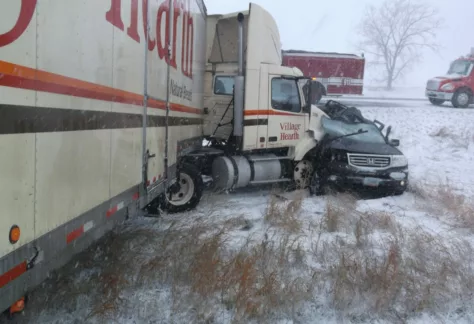In a move that at first glance may appear to be overly cautious, but that in the long run will contribute to a reduction in the number of truck accidents, the National Highway Traffic Safety Administration (NHTSA) recently made permanent an existing requirement for trailers with antilock brake systems to be equipped with an external malfunction indicator lamp that monitors the vehicle’s ABS. Published on August 25, 2009 in the Federal Register, the final rule extends the rule that had originally been scheduled to expire on March 1, 2009, and previously had been extended to September 1, 2009.
The NHTSA was planning to let the safety precaution expire after being in effect for eight years because it was believed that tractors manufactured prior to 2001 and lacking dedicated ABS malfunction indicator lamps on their trailers would be off the road by March of 2009. This belief was based on the usual serviceable life span of such tractors of five to seven years. Further, the NHTSA pointed out that most tractors are equipped with ABS malfunction indicator lamps in their cabs and therefore would not need trailer-mounted lamps. The NHTSA believed that the existing requirement could expire without increased risk of big rig wrecks.
However, safety officials with the Commercial Vehicle Safety Alliance (CVSA) disagreed. The CVSA, which describes itself as “an international not-for-profit organization comprised of local, state, provincial, territorial and federal motor carrier safety officials and industry representatives from the United States, Canada, and Mexico,” and works to “promote commercial motor vehicle safety and security” petitioned the NHTSA on two occasions to make the requirement permanent.
The CVSA argued that the requirement needed to be made permanent for several reasons. They noted that not all pre-2001 tractors would be off the road when the requirement was originally scheduled to expire in March of 2009. Further, they pointed out that for double and triple trailer applications, an in-cab lamp would not indicate which trailer’s ABS was malfunctioning. They also informed NHTSA that mechanics often rely on external malfunction indicator lamps to quickly assess the condition of a trailer’s ABS without having to couple a post-2001 tractor to the trailer, a step some harried mechanics may have elected to skip altogether placing a trailer with compromised braking capacity back on the roadway. Finally, the CVSA noted that the lack of an external lamp would leave it up to drivers to interpret whether a flashing in-cab light signaled a malfunctioning in-cab bulb, a pre-1998 trailer with no ABS, a short circuit in the trailer/tractor wiring, or … a malfunctioning ABS. When present, an external lamp helps clarify the situation, leading to quicker and more accurate diagnoses for mechanics and drivers.
Referrals & Co-Counsel
Involved in a Crash?
No other law firm knows trucks quite like us. Our trucking law expertise and trial experience allow us to win multi-million-dollar results year after year.
Our team of truck accident attorneys works tirelessly to help your family find justice in the wake of a catastrophic truck crash.
Referrals & Co-Counsel
No other law firm knows trucks quite like us. Our trucking law expertise and trial experience allow us to win multi-million-dollar results year after year.
Involved in a Crash?
Our team of truck accident attorneys works tirelessly to help your family find justice in the wake of a catastrophic truck crash.
The American Trucking Associations (ATA), a group that represents the interests of trucking companies, is against making the requirement permanent. They argue that extending the regulation to March 1, 2011 would be sufficient. I disagree. The CVSA is correct in noting that some trailers are in service beyond a five to seven year period. And external lamps do help inspectors and mechanics quickly assess the condition of trailer ABS. What’s more, a properly functioning ABS works in conjunction with new electronic stability control systems, which rely on ABS in order to be effective.
As a truck accident lawyer, I've seen too many tragedies caused by improperly functioning equipment. The added safety of the external lamps and the potential they have for preventing truck accidents more than justifies the NHTSA move.


